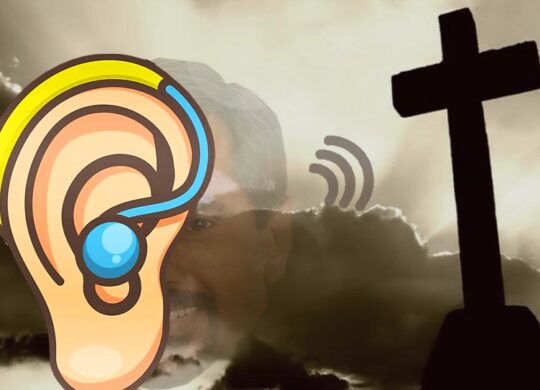Hear?

You think you are going bonkers? Me, too.
I have a solution for all our problems. Hearing aids!
So saith a group of researchers in Singapore in “Association of Hearing Aids and Cochlear Implants With Cognitive Decline and Dementia: A Systematic Review and Meta-analysis,” published in JAMA Neurology last December.
Bottom line: Using hearing aids significantly reduce the risk for cognitive decline and dementia and even improve short-term cognitive function in individuals with hearing loss.
(Of course, you gotta have hearing loss to take advantage of this hearing-aid-induced prevention of cognitive decline and dementia. Bummer!)
In this systematic review and multiadjusted observational meta-analysis of over 3,200 other studies, including 137,484 participants, the use of hearing restorative devices was associated with a 19% decrease in hazards of long-term cognitive decline such as incident dementia over a duration ranging from 2 to 25 years.”
Apparently even those with some dementia began to see improvement with hearing aids.
Said Dr. Benjamin Tan, one of the authors:
Encouragingly, even patients who already started with mild cognitive impairment, or early dementia, in our pooled analysis also benefited from the use of hearing aids, as they also had approximately 20% lower risk of progressing to dementia. This means that it is never too late to start using hearing aids, but early treatment may help to preserve the most cognition.”
The results were similar in studies conducted in North America, Asia, and Europe.
How this works is not known, but hearing loss is a known risk factor for dementia.
To be beneficial, hearing aids should be worn for more than 4 hours a day, they say. The earlier you begin, the better the outcome.
Once the psalmist, writing Psalm 17, was in serious trouble. And he called upon God for assistance.
I—I have called upon You, for You answer me, God;
stretch Your ear to me, hear my utterance.
Psalm 17:6
The psalmist is obviously under serious attack. So he appeals to God to rescue and to retaliate. Can God hear, or is he in some phase of dementia and in need of hearing aids? Yes, to the first, and no, to the second.
Work wonders of Your lovingkindness,
You who deliver those taking refuge
from those who rise up by Your RIGHT HAND. …
Hide me from the face of the wicked who assault me—
my deadly enemies around me.
They have closed their insides;
their mouth, it has spoken arrogantly. …
They set their eyes to stretch [us] out on the ground. …
Arise, Yahweh, be in front of his face, bring him to his knees; …
Kill them by Your HAND, Yahweh.
Psalm 17:7–10, 13–14
Psalm 17 has a lot of body parts in it. Notice those in 17:7–14. These are the only verses with enemies’ body parts (17:9–13; bold). And they are hedged between the upper limbs of God on either side (ALL CAPS). Squeezed. Isolated. Quarantined. Away from the body parts of the suffering psalmist (you can find those in 17:1–5). The “hand/right hand” of God is a symbol for divine power, and they encloses and destroys the enemy, keeping those malefactors literarily (and literally) away from the psalmist, in text and in life!
Yup, God can hear. He may be “the Ancient of Days” (Dan 7:9, 22), but he ain’t going through no dementia. No sir, not God.
So the psalmist is not staying up all night. He’s going to sleep.
I—in righteousness I shall behold Your face;
I will be satisfied, when I awake ….
Psalm 17:15
Because God has heard.
SOURCES: MedScape; JAMA Neurology











 Abe Kuruvilla is the Carl E. Bates Professor of Christian Preaching at The Southern Baptist Theological Seminary (Louisville, KY), and a dermatologist in private practice. His passion is to explore, explain, and exemplify preaching.
Abe Kuruvilla is the Carl E. Bates Professor of Christian Preaching at The Southern Baptist Theological Seminary (Louisville, KY), and a dermatologist in private practice. His passion is to explore, explain, and exemplify preaching.
2 Comments
As an audiologist, I could have told you this. It’s 1 of the many reasons that I love helping people hear again. Thank you for bringing this to our attention & for the valuable verses.
Thanks!